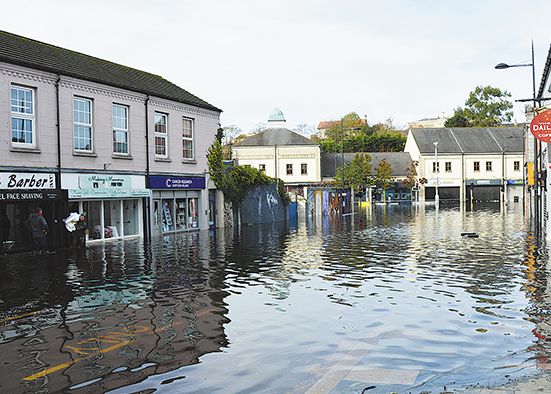Council’s u-turn on flooding meeting
Council’s u-turn on flooding meeting
27 March 2024

NEWRY, Mourne and Down Council has been forced into a dramatic U-turn over a decision to exclude Downpatrick traders from a meeting today to discuss last November’s catastrophic town centre flood.
Invites to the private session being held this afternoon in Down Leisure Centre had only been extended to a number of groups, none of which directly represent the town’s business community.
Initially, the local authority said the invitation-only session — which is being handled by an independent engineering consultancy firm — would not be open to businesses whose premises were swamped by the flood.
However, in the wake of traders’ concern at their exclusion, the local authority performed an eleventh hour climbdown yesterday afternoon.
It confirmed that in the absence of a business representative group in Downpatrick, it has been agreed to invite a number of traders to represent the town’s wider business community to the flooding review meeting.
Up until this point, the local authority was adamant that the closed session was only open to various interest groups and not a single Downpatrick trader impacted by the flood would be in attendance.
The event has been arranged to gather technical data to determine what caused the flooding, inform decisions on any viable flood defence measures in the affected areas and recommendations for a similar future emergency.
It is designed to provide an opportunity for representatives from a number of groups to “freely provide experiences of the flooding event and multi-agency response to the independent consultant to inform the overall review findings”.
As some businesses fear what the future holds, there was disbelief that traders’ voices were not going to be heard.
A council spokeswoman confirmed yesterday: “In the absence of a business representative group in Downpatrick, it has been agreed to invite a number of traders to represent the wider Downpatrick business community to tomorrow’s flooding review meeting.”
Groups which have been invited to take part include the Downpatrick Regeneration Working Group, County Down Rural Community Network, Down Enterprise Agency, Downpatrick and Co Down Railway, Hospitality Ulster, Retail NI and the Federation of Small Businesses.
South Down MLA Patrick Brown said it appeared from a strict interpretation of the invite that only key stakeholders, including elected representatives and business groups, would be there.
He confirmed that he questioned senior council officials, pointing out that there was no business representative group for all Downpatrick businesses, unlike in Newry, and that any of the business groups in the town, whilst doing good work, “don’t represent those businesses which were flooded”.
He continued: “I highly doubt that the event organisers will turn away individual businesses from the event as to do so would exclude incredibly valuable voices from contributing to this review. I do think however that more effort should have went into ensuring flooded businesses were represented formally at this event.”
The MLA has also raised concern about the business support grant for flood affected businesses which is offering financial support of up to £100,000.
He said “major issues remain” how residents, businesses and entire communities are assisted to bounce back from the flooding.
Mr Brown said business owners in Downpatrick have raised serious concerns that the flood recovery fund will be paid out in arrears by the local council.
“The guidance document issued suggests that money will be paid out on submission of receipts and invoices, rather than quotes,” he explained.
“This means that businesses, most of whom have not recovered financially from the recent flooding, may have to fund the purchase of equipment, fixtures, fittings and stock themselves before the council will pay out any grant money over £10,000.”
Mr Brown added: “This presents major cashflow issues for small businesses who simply don’t have the money to fork out for these purchases five months after the floods hit. It’s important a common sense solution is developed which will allow this money to be paid out in advance to businesses, after which receipts and invoices could be provided for audit purposes.”


